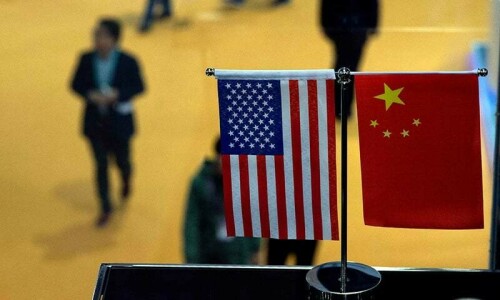ISLAMABAD, July 31: Former Azad Kashmir president Sardar Mohammad Ibrahim Khan died in Islamabad on Thursday aged 88 as the oldest Kashmiri politician whose eventful career ranged from leading a revolutionary government to struggle for democracy.
The four-time Azad Kashmir president died at his Islamabad home on Thursday morning after a protracted illness and will be buried at his native Rawalakot town in Azad Kashmir on Friday at 11am, family sources said.
President Gen Pervez Musharraf and Prime Minister Zafarullah Khan Jamali, in their separate messages, expressed their profound grief at Sardar Ibrahim’s death while the Azad Kashmir government declared a three-day mourning for the man who founded it in October 1947 at the start of an armed revolt to liberate Kashmir from its last Dogra ruler, Maharaja Hari Singh.
Sardar Ibrahim’s four terms in office — twice appointed by the territory’s oldest All Jammu and Kashmir Muslim Conference (AJKMC) party under a then-prevailing arrangement and twice as elected president — has been a mix of harmony and problems with the Pakistani government.
His first serious differences with the then Pakistani government in the 1950s led to the establishment of a short-lived “parallel government” in Azad Kashmir that collapsed after a police action in his home district of Poonch in 1954.
His last clash with Islamabad occurred in 1978 when he rejected military ruler General Mohammad Zia-ul-Haq’s order to resign and preferred a forced removal, which was declared illegal by the territory’s high court years later.
From the start of his political career before the partition of the subcontinent in 1947, Sardar Ibrahim, a barrister and a scion of the martial Sudhan tribe, has been an ardent advocate of the concept of Kashmir’s accession to Pakistan.
But he had not been averse to those seeking to reunite Kashmir into an independent state. In a revised chapter of his book, The Kashmir Saga, he suggested a neutralised Kashmir state on the pattern of Switzerland. He wrote another book in Urdu — Mata-i-Zindagi (achievement of life).
It was Sardar Ibrahim’s house in Srinagar on July 19, 1947, that an AJKMC working committee meeting passed a resolution seeking Kashmir’s accession to Pakistan, reversing an earlier resolution for the state’s independence.
The accession resolution is marked every year as a national day in Azad Kashmir, where a government led by Sardar Ibrahim was formed on Oct 24, 1947, after he arrived in Pakistan from Srinagar in disguise.
His second term as a nominated president was from April 14, 1957, to May 14, 1959, when then military ruler General Mohammad Ayub Khan replaced him with Mr K.H. Khurshid following an AJKMC-led movement to cross the ceasefire line.
His terms as elected president were from June 5, 1975, to Oct 31, 1978, as a nominee of the Pakistan People’s Party and from Aug 25, 1996, to Aug 24, 2001, after he parted company with the PPP but entered into a coalition with it through the breakaway Azad Kashmir People’s Party led by his son Khalid Ibrahim.
BURIAL WITH HONOURS: An Azad Kashmir government notification said Sardar Ibrahim would be buried in Rawalakot with “complete official honours”.
The Azad Kashmir flag will fly half-mast for three days while Thursday and Friday have been declared as public holidays to mourn Sardar Ibrahim’s death.
President Musharraf, in his message, paid tributes to Sardar Ibrahim for his life-long commitment to the Kashmir cause, and said the late leader remained committed to Kashmiris’ rights and advocated their cause forcefully at numerous international fora.
Prime Minister Jamali said Sardar Ibrahim was a committed and sincere leader and “a source of strength for the freedom movement ... His death will certainly sadden freedom fans the world over.”
Azad Kashmir President Sardar Mohammad Anwar Khan, Prime Minister Sardar Sikandar Hayat Khan, in their messages, also paid rich tributes to Sardar Ibrahim for his meritorious services for the cause of freedom movement as also for the progress and development of the territory.














































